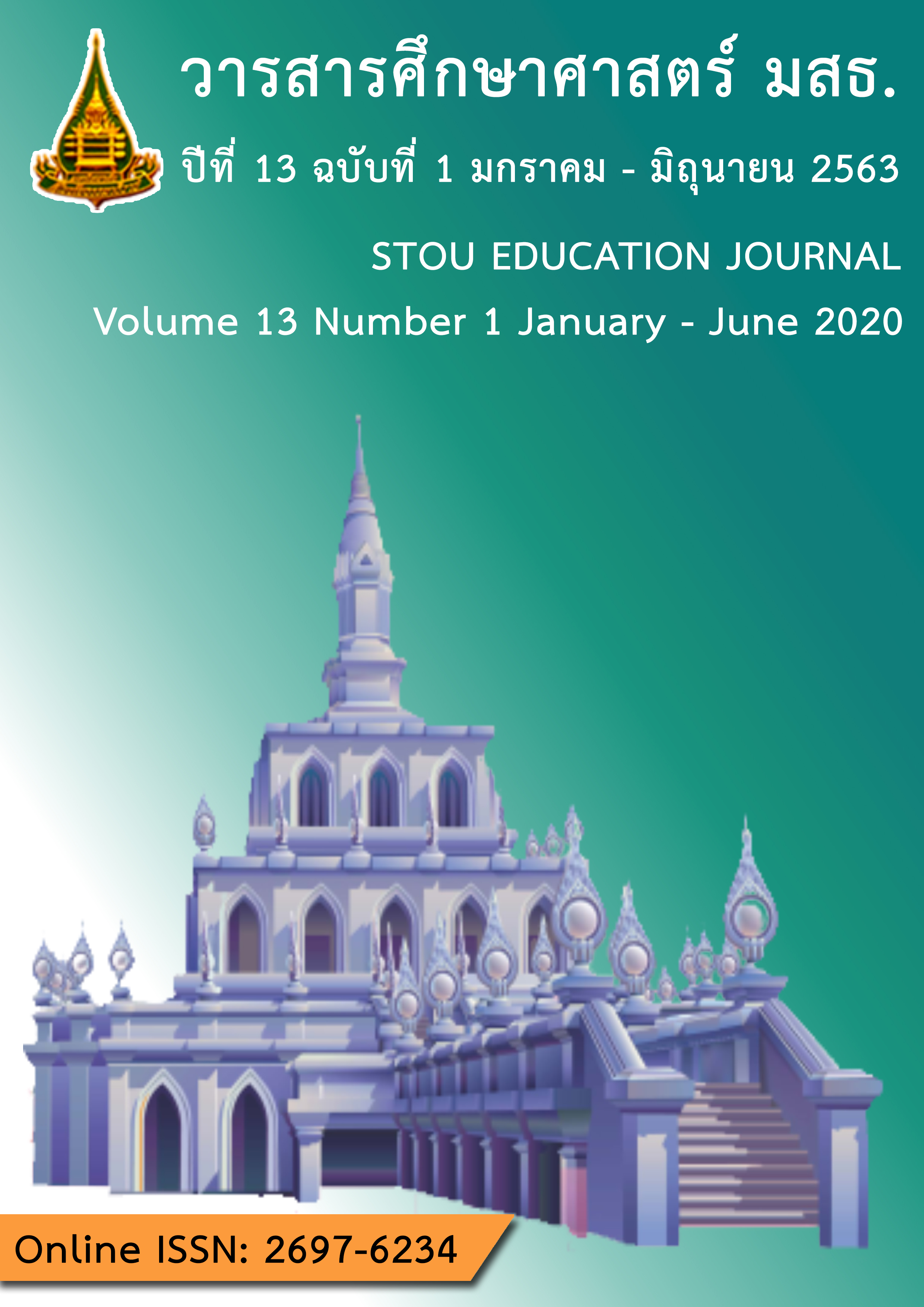ผลการจัดการเรียนรู้แบบร่วมมือเพื่อพัฒนาทักษะการพูดภาษาไทยของนักเรียนชั้นมัธยมศึกษาปีที่ 5
Main Article Content
บทคัดย่อ
การวิจัยนี้มีวัตถุประสงค์เพื่อ (1) เปรียบเทียบผลสัมฤทธิ์ทางการเรียนวิชาการพูดของนักเรียนชั้นมัธยมศึกษาปีที่ 5 ที่เรียนโดยการจัดการเรียนรู้แบบร่วมมือก่อนเรียนและหลังเรียน (2) เปรียบเทียบทักษะการพูดของนักเรียนชั้นมัธยมศึกษาปีที่ 5 ที่เรียนโดยการจัดการเรียนรู้แบบร่วมมือก่อนเรียนและหลังเรียน และ(3) เปรียบเทียบเจตคติต่อการเรียนวิชาการพูดของนักเรียนชั้นมัธยมศึกษาปีที่ 5 ที่เรียนโดยการจัดการเรียนรู้แบบร่วมมือก่อนเรียนและหลังเรียน กลุ่มตัวอย่างเป็นนักเรียนชั้นมัธยมศึกษาปีที่ 5 โรงเรียนบางปลาม้า “สูงสุมารผดุงวิทย์” จัดนักเรียนแบบคละความสามารถ แผนการเรียนภาษาและเทคโนโลยีที่เรียนวิชาการพูด จำนวน 43 คน ได้มาโดยการสุ่มแบบหลายขั้นตอน เครื่องมือที่ใช้ในการวิจัยประกอบด้วย แผนการจัดการเรียนรู้แบบร่วมมือรายวิชาการพูด แบบวัดทักษะการพูด แบบวัดผลสัมฤทธิ์ทางการเรียนวิชาการพูด และแบบวัดเจตคติต่อการเรียนวิชาการพูด สถิติที่ใช้ในการวิเคราะห์ข้อมูล ได้แก่ ค่าเฉลี่ย ส่วนเบี่ยงเบนมาตรฐาน และการทดสอบค่าที ผลการวิจัยปรากฏว่า (1) ผลสัมฤทธิ์ทางการเรียนวิชาการพูดของนักเรียนชั้นมัธยมศึกษาปีที่ 5 หลังเรียนโดยการจัดการเรียนรู้แบบร่วมมือสูงกว่าก่อนเรียนอย่างมีนัยสำคัญทางสถิติที่ระดับ .05 (2) ทักษะการพูดของนักเรียนชั้นมัธยมศึกษาปีที่ 5 หลังเรียนโดยการจัดการเรียนรู้แบบร่วมมือสูงกว่าก่อนเรียนอย่างมีนัยสำคัญทางสถิติที่ระดับ .05 และ(3) เจตคติต่อการเรียนวิชาการพูดของนักเรียนชั้นมัธยมศึกษาปีที่ 5 หลังเรียนโดยการจัดการเรียนรู้แบบร่วมมือสูงกว่าก่อนเรียนอย่างมีนัยสำคัญทางสถิติที่ระดับ .05
Article Details
เอกสารอ้างอิง
ชลธิชา ทับทวี. (2554). ผลการจัดการเรียนรู้แบบร่วมมือด้วยเทคนิคเพื่อนคู่คิดที่มีต่อความสามารถในการคิดอย่างมีเหตุผลเรื่อง อัตราส่วนตรีโกณมิติของนักเรียนมัธยมศึกษาปีที่ 3 (วิทยานิพนธ์ปริญญามหาบัณฑิต ไม่ได้ตีพิมพ์). มหาวิทยาลัยศรีนครินทรวิโรฒ, กรุงเทพมหานคร.
ฐิตารีย์ เกิดสมกาล. (2555). การศึกษาความสามารถในการอ่านจับใจความสำคัญและเจตคติต่อวิชาภาษาไทย ของนักเรียนชั้นประถมศึกษาปีที่ 6 ที่ได้รับกรจัดการเรียนรู้แบบร่วมมือเทคนิค STAD (วิทยานิพนธ์ปริญญามหาบัณฑิต ไม่ได้ตีพิมพ์). มหาวิทยาลัยราชภัฏนครศรีธรรมราช, นครศรีธรรมราช.
ทิศนา แขมมณี. (2554). ศาสตร์การสอน: องค์ความรู้เพื่อการจัดกระบวนการเรียนรู้ที่มีประสิทธิภาพ. กรุงเทพมหานคร: สำนักพิมพ์แห่งจุฬาลงกรณ์มหาวิทยาลัย.
บุญสม ภูศิริ. (2546). การพัฒนาทักษะการพูดและพฤติกรรมกล้าแสดงออกทางการพูดโดยใช้บทบาทสมมติของนักศึกษาประกาศนียบัตรวิชาชีพชั้นปีที่ 1 วิทยาลัยเกษตรและเทคโนโลยีตรัง (วิทยานิพนธ์ปริญญามหาบัณฑิต ไม่ได้ตีพิมพ์). มหาวิทยาลัยสุโขทัยธรรมาธิราช, นนทบุรี.
พิมพันธ์ เดชะคุปต์. (2541). การเรียนแบบร่วมมือ. กรุงเทพมหานคร: จุฬาลงกรณ์มหาวิทยาลัย.
รสริน ป้อมสาหร่าย. (2550). ผลของการใช้การเรียนแบบร่วมมือที่มีต่อความสามารถด้านการพูดภาษาอังกฤษ และความพึงพอใจในการเรียนแบบร่วมมือของนักเรียนชั้นประถมศึกษาปีที่ 6 (วิทยานิพนธ์ปริญญามหาบัณฑิต ไม่ได้ตีพิมพ์). มหาวิทยาลัยราชภัฏพิบูลสงคราม, พิษณุโลก.
ลัดดา ฉิมสุวรรณ.(2551). ผลการใช้เพลงพื้นบ้านลำตัดเพื่อพัฒนาการพูดโต้ตอบเชิงสร้างสรรค์ของนักเรียนชั้นมัธยมศึกษษปีที่ 3 โรงเรียนวัดสามง่าม กรุงเทพมหานคร (วิทยานิพนธ์ปริญญามหาบัณฑิต ไม่ได้ตีพิมพ์). มหาวิทยาลัยสุโขทัยธรรมาธิราช,นนทบุรี.
เลอสม สถาปิตานนท์. (2560). พระคุณแนบไว้ในนิรันดร: พระบรมราโชวาท และพระราชหัตถเลขา พระบาทสมเด็จพระปรมินทรมหาภูมิพลอดุลยเดช พระราชทานแก่จุฬาลงกรณมหาวิทยาลัย.กรุงเทพมหานคร: จุฬาลงกรณ์มหาวิทยาลัย.
ศักดา ปั้นเหน่งเพ็ชร์.(2554). หน่วยที่ 8 การพัฒนาทักษะการพูด ใน ประมวลสาระชุดวิชาการพัฒนาทักษะทางภาษา หน่วยที่ 7-10 (พิมพ์ครั้งที่ 2, น. 41-147). นนทบุรี: สาขาวิชาศึกษาศาสตร์ มหาวิทยาลัยสุโขทัยธรรมาธิราช.
สนิท ตั้งทวี. (2537). ศิลปะการสอนภาษาไทย. กรุงเทพมหานคร: สำนักพิมพ์โอเดียนสโตร์.
อัจฉรา ชีวพันธ์. (2546). ศิลปการจัดการเรียนรู้ภาษาไทยระดับประถมศึกษา. กรุงเทพมหานคร: สำนักพิมพ์เพ็นพับลิชชิ่ง.
Arends, R. I. (1994). Learning to teach.(3rd ed.). New York: McGraw-Hill, Inc,Chapman.
Johnson, D., W., & Johnson, T. (1987). Learning together and alone: Cooperative and individualistic learning. London: Prenice Hll.
Kagan, S. (1995). Cooperative learning & wee science. San Clemento: Kagan Cooperative Learning.
Thorndike, E. L. (1966). Human learning. Cambridge, Mass: M.I.T. Press.
Zakaria, E., Chin, L. C., & Daud, M. Y. (2010). The effects of cooperative learning on students’ mathematics achievement and attitude towards mathematics. Journal of social sciences, 6(2), 272-275.


